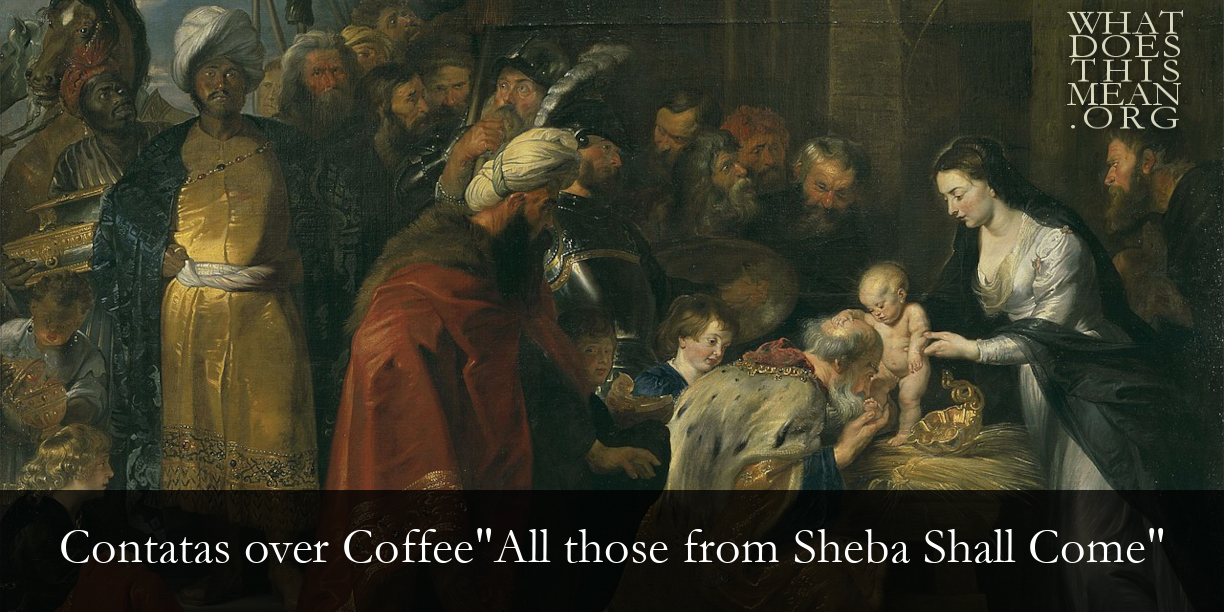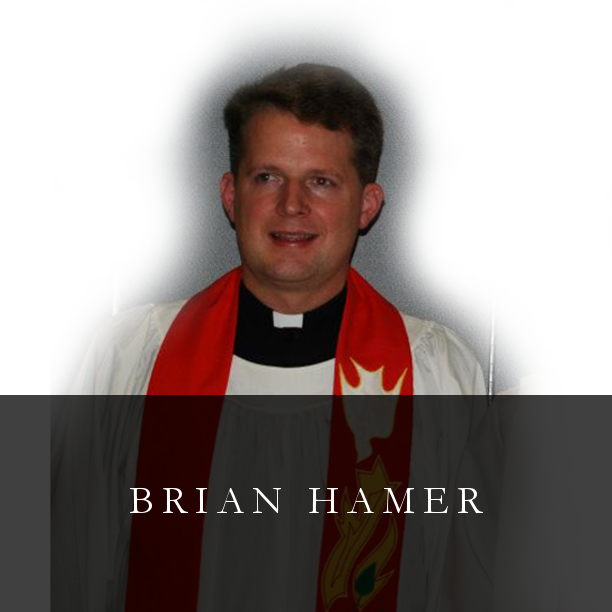where the guests are gladdened with water made wine, alleluia.
The opening chorus “shows off the glittery sheen of his exotic orchestra to advantage . . . parading before our eyes the stately procession of the three magi and the ‘multitude of camels’ (Isaiah 60:6) laden with gifts” (John Eliot Gardiner, BACH: Music in the Castle of Heaven, p. 328). The use of sets of three is striking. The wind instrumentation might represent the three gifts of the Magi: the horns for gold, frankincense by the oboes da caccia, and myrrh by the recorders which were often used in funeral music in Bach’s day. The opening statement in the horns is a memorable set of three groups of three notes, which rises in a gesture of worship to the boy Jesus. This motif is expanded as the voices enter individually and the ensemble gradually swells into a fantasia, which lasts about four minutes – nearly one-fourth of the length of the cantata. The 12/8 meter seems to depict the sway of the camels on their long journey. The movement concludes with a restatement of the opening theme (4:03 in the video), spread in unison over the vast expanse of five octaves. One can sense that the caravan has arrived at the house in Bethlehem, and the Magi are ready to fall down before the Christ and worship Him.
As is often the case with Bach’s cantatas, the opening chorus is so remarkable that it is tempting to skip the subsequent movements, but the story is far from over at this point in Cantata 65. The second movement is a short chorale, a highly unusual placement in Bach’s cantatas, where they usually conclude the work. But as you survey the text below the video link, you will see the textual connection. While the first movement narrates the journey of the kings from the perspective of Isaiah 60, the second movement gives all the faithful a chance to proclaim the good news that they have arrived, but using the language of Matthew 2, as it appears in the German version of the Latin hymn, “A Child is Born in Bethlehem.”
The next four movements (#3-6) use male soloists, appropriate for two Scripture lessons in which only the men speak. The bass recitative and splendid aria with two obbligato oboes da caccia exhort the listener to commit even greater gifts to Christ, far surpassing the tangible gifts of the Magi: the heart, mind, and soul that trust in God alone, depicted by the triple canon. The tenor recitative and aria address a similar theme, imploring Christ to accept our spiritual worship and in a cheerful aria expressing the fervent joy of life together in Christ, using opulent scoring to depict the “most abundant wealth” mentioned in the text. A second chorale combines a somewhat lesser-known text by Paul Gerhardt with the familiar tune, “The Will of God is Always Best” to conclude the cantata.
The following performance of this opulent cantata by the Netherlands Bach Society honors the music with professional musicians, period instruments, and superb cinematography. Starting times for movements 2-7 are provided in parentheses. Before you listen, I invite you to read the Scripture lesson this cantata was intended to expound, Isaiah 60:1-6 and St. Matthew 2:1-12. As you listen, please mediate on the cantata text, enjoy a cup of coffee (this is, after all, the “Cantatas Over Coffee” series) and enjoy the artwork at the head of this article.
| 1. Chorus They will all come from Sheba, bring gold and incense, and praise the Lord. (Isaiah 60: 6) 2. Choral (4:18) The kings from Sheba came, gold, frankincense, and myrrh they offered, Alleluia! 3. Recitative for Bass (5:28) What Isaiah foresaw there, That happened at Bethlehem. Here the wise men appear at Jesus' manger and want to praise him as their king. Gold, frankincense and myrrh are the precious gifts With which they grace this baby Jesus in Bethlehem in the stable. My Jesus, if I think of my duty now, I must also turn to your manger and likewise be grateful: For this day is a day of joy for me, Since you, O prince of life, Are the light of the Gentiles and their Redeemer. But what do I bring, you King of Heaven? If my heart is not too little for you, then accept it graciously, Because I cannot bring anything more noble. 4. Aria for Bass (7:28) Gold from Ophir is no gem, away, only away with vain gifts that you break out of the earth! Jesus wants the heart. Give this, O Christians, to Jesus at the New Year! 5. Recitative for Tenor (10:18) Do not disdain, you, the light of my soul, my heart, which I humbly bring to you; It includes such things at the same time, which are the fruits of your spirit. The gold of faith, the incense of prayer, The myrrh of patience are my gifts, You, Jesus, shall have them forever As a possession and as a gift. But also give yourself to me, so you will make me richest on earth; Because if you are with me The greatest abundance of wealth Will one day be mine in heaven. 6. Aria for Tenor (11:41) Take me for your own, take my heart for a gift. Everything, everything that I am, What I say, do and think, Shall, my Savior, be dedicated to your service only. 7. Chorale (15:22) And now, my Lord, I come to Thee, assured in Thy hands. Take me and do so unto me until my last end, As you well know that my spirit comes to its benefit through this, and Thine honor increases more and more in me. |
Forasmuch as in the Jordan Christ hath cleansed her iniquities.
Therefore do the Wise Men hasten with their offerings to the royal nuptials:
Where the guests are gladdened with water made wine. Alleluia.



 RSS Feed
RSS Feed
